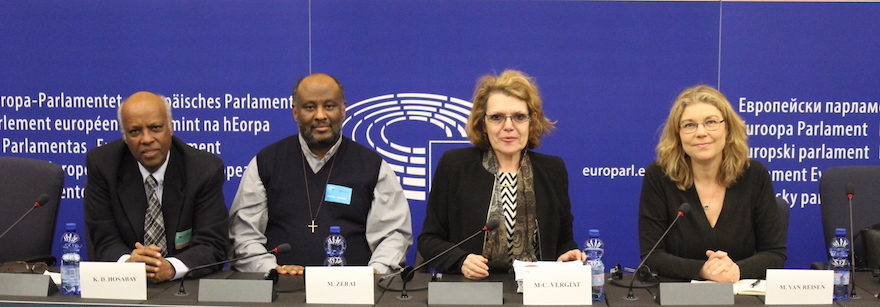By Klara Smits and Florence Tornincasa
STRASBOURG (IDN) – The European Parliament has adopted a resolution on Eritrea, which sends a strong signal to the European Commission, the EU Council, member states and the Eritrean government that human rights violations in the country need to be addressed.
The resolution approved on March 10 clearly identifies that Eritrean refugees are fleeing serious human rights violations and an indefinite national service which constitutes slavery.
The resolution also addresses the systematic extortion of refugees, a concern expressed earlier in resolutions adopted by the UN Security Council.
The European Parliament expressed concern that the EU Council had adopted a € 200 million aid package without reference to the Parliament’s negative advice.
Several Eritrean representatives, Nobel Prize Nominee Mussie Zerai, an Eritrean Catholic priesr, former Eritrean Vice Minister of Finance Kubrom Dafla Hosabay and a former refugee, Zekarias Kebreab, met with Parliamentarians.
The Eritrean representatives asked members of the European Parliament (MEPs) to oppose the European aid package, which will not benefit the Eritrean people, according to them, and will not alleviate the root causes of the refugee crisis but aggravate the causes of why people are fleeing the country.
MEPs spoke with a uniquely united voice cutting across the political spectrum during the debate on Eritrea prior to the vote.
MEPs stressed that giving aid to Eritrea, characterised as the “North Korea of Africa”, will not benefit the Eritrean people. On the contrary, it will make life harder for them, they argued.
The European Parliament resolution urges the EU to continue supporting Eritrea, but its aid must meet the needs of Eritrean people and should be conditional upon putting an end to human rights violations, enacting reforms and improving economic governance in the country.
The Parliament urges the government of Eritrea to put an end to the system of indefinite national service, which can be compared to a “form of slavery”.
Indefinite National Service, combined with forced labour and shoot-to-kill policy at the border, may constitute “crimes against humanity”, currently being investigated by the UN Commission of Inquiry.
The resolution addresses the ‘long arm of the Eritrean regime’. It pays particular attention to the role of the embassies and the youth wing of the Eritrean government party outside of Eritrea.
Refugees who flee Eritrea are pressured to pay 2% tax to the country. Critics are threatened – the resolution names as example the myriad of court cases which started in the Netherlands by regime supporters against the media, presumably to silence criticism.
The European Parliament urged the EU Council and Commission to deliberate with the European Parliament on any next steps on allocation, and reminded the EU institutions of its powers on Budget Control.
In a press conference organised by Marie-Christine Vergiat, Mussie Zerai stated: “there is no rule of law in Eritrea”. Eritrean catholic priest Zerai and defender of refugees said: “Europe is ready to pay a dictator in order to stop migration, no matter how dangerous the dictator is.”
The former Vice Minister of Finance of the Eritrean regime, Kubrom Hosabay, stated: “The problem is not economic, it is not about money, the problem is about the rights; where are the Eritrean fundamental rights?”
Dutch professor and human rights activist, Mirjam van Reisen, spoke about the broken promises of the Eritrea government. “Eritrea will continue with the indefinite National Service”, she said, “despite promising the EU that it will limit it.” [IDN-InDepthNews – 10 March 2016]
Related articles:
http://www.indepthnews.info/index.php/global-issues/2732-court-rules-in-favour-of-dutch-human-rights-advocate
IDN is the flagship of International Press Syndicate.
Photo: Press conference at the European Parliament on Eritrea on March 10, 2016. Left to right: Kubrom Dafla Hosabay, Father Mussie Zerai, MEP Marie-Christine Vergiat (from the GUE/NGL group), Prof. Mirjam van Reisen. Credit: Florence Tornincasa (EEPA).

